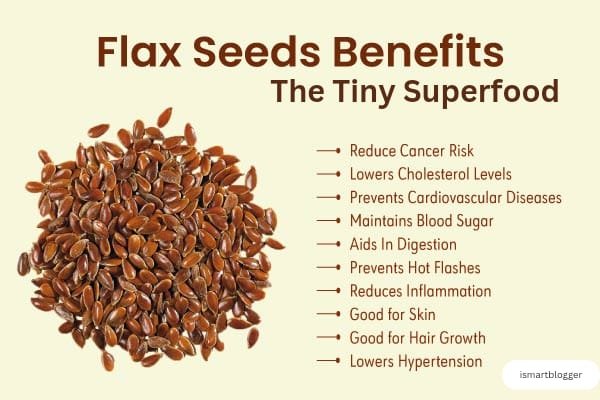“Flaxseed, often labeled a superfood, offers a multitude of health benefits owing to its rich nutrient content. This small seed boasts high fiber, protein, and healthy fat levels, complemented by vitamins and minerals such as B6, folate, magnesium, and potassium. Notable advantages include reducing heart disease risk factors, managing cholesterol, promoting digestive health, regulating blood sugar levels, combating inflammation, and decreasing breast cancer risk. Incorporating flaxseed, ideally ground for optimal absorption, into daily intake can be through various means like smoothies and oatmeal. However, some individuals may experience digestive issues, warranting caution, especially for pregnant or breastfeeding individuals and those under specific medications. Despite potential side effects, flaxseed’s extensive health benefits make it a valuable addition to any diet.

Flaxseed has gained a reputation as a superfood, and for good reason. This tiny seed is packed with essential nutrients that can provide a range of health benefits, from reducing the risk of heart disease to managing blood sugar levels. In this article, we’ll explore the nutritional value of flaxseed, its health benefits, and how to incorporate it into your diet.
Nutritional Value of Flaxseed:
Flaxseed is an excellent source of nutrients, including fiber, protein, and healthy fats. It’s also rich in essential vitamins and minerals, such as vitamin B6, folate, magnesium, and potassium. These nutrients work together to provide a range of health benefits.
Health Benefits of Flaxseed:
Reduction in risk of heart disease:
Flaxseed can help lower blood pressure and cholesterol levels, both of which are risk factors for heart disease.
Lowering cholesterol levels:
The high fiber content in flaxseed can help reduce LDL or “bad” cholesterol levels.
Promoting digestive health:
Flaxseed contains both soluble and insoluble fiber, which can help regulate digestion and prevent constipation.
Managing blood sugar levels:
Flaxseed can help regulate blood sugar levels, making it a good addition to the diet of people with diabetes.
Anti-inflammatory properties:
The omega-3 fatty acids in flaxseed can help reduce inflammation in the body.
Reducing cancer risk:
Flaxseed contains lignans, which are plant compounds that have been shown to reduce the risk of breast cancer.
How to Incorporate Flaxseed into Your Diet:
Flaxseed can be added to a variety of foods, including smoothies, oatmeal, and baked goods. It’s important to note that whole flaxseed can pass through the digestive system undigested, so it’s recommended to use ground flaxseed for maximum absorption. The recommended daily intake of flaxseed is 1-2 tablespoons per day.
Possible Side Effects and Precautions:
While flaxseed is generally safe to consume, it can cause digestive issues in some people, such as bloating or diarrhea. Pregnant and breastfeeding women should also use caution when consuming flaxseed, as it may affect hormone levels. Additionally, flaxseed can interact with some medications, so it’s important to talk to a doctor before adding it to your diet.
Conclusion:
Flaxseed is a tiny seed with big benefits. Its high nutrient content and health benefits make it a valuable addition to any diet. Whether you’re looking to reduce your risk of heart disease or improve your digestive health, incorporating flaxseed into your diet is a simple and effective way to promote overall wellness.
Overall, flaxseed is a versatile and easy-to-use superfood that can provide a range of health benefits. Its rich nutrient profile, anti-inflammatory properties, and ability to lower the risk of heart disease and cancer make it a valuable addition to any diet. Just remember to use ground flaxseed for maximum absorption and to talk to your doctor before adding it to your diet if you’re pregnant, breastfeeding, or taking medication. With its impressive range of health benefits, it’s clear that flaxseed is a tiny superfood that should not be overlooked!
